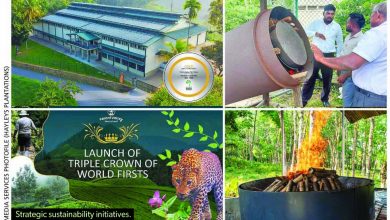YOUTH FORUM
Compiled by Savithri Rodrigo
SOCIAL MEDIA IS A WINNER
Samath Gamlath views advancements in media technology in a positive light
Q: What do you consider the positives for Sri Lanka?
A: Sri Lanka is one of the most beautiful countries on this planet; it is second to none in terms of natural resources and biodiversity. It’s a nation built on great cultures, traditions and Buddhist teachings with a documented history spanning over 2,500 years.
While celebrating a unique history that combines the peaceful teachings of Buddhism, our country also possesses talented artistes, engineers, agricultural experts and numerous other learned individuals.

Q: Are there changes you wish to see in the spheres of education and healthcare?
A: Due to the lack of capacity in universities, a majority who wish to pursue higher studies through the free education system have to forego that opportunity. Students who are economically able receive higher education through private local and foreign universities.
Therefore, the system encourages students to leave Sri Lanka, which results in the loss of productive young individuals. If education can be linked to the country’s resources, our nation would be successful in the long term.
State sponsored healthcare must be distributed more equitably throughout the provinces and general population. Hospitals and medical services, which are designed and provided on the basis of documented populations in various demographics, would imply that the system is cost-effective and does not put a strain on state finances.
Q: What are the challenges facing the nation today?
A: This refers to economic turmoil due to the absence of an astute growth plan. The lack of export growth is a major reason for this economic situation. Despite Sri Lanka being rich in natural resources, it has failed to grow its exports and continues to engage in excessive importation, which is clearly detrimental to economic progress.
The brain drain is another factor contributing to economic fallout. We witness skilled professionals consciously migrating, which leads to a huge gap in the country’s productive capacity. Inefficient public administration, and a lack of adherence to rules and regulations, cause structural breakdowns – and they addto the nation’s worsening problems.
Q: Where do you see Sri Lanka in 10 years’ time?
A: In a world where technology and innovation lead to discoveries and developments every day, Sri Lanka continues to stand strong. We have produced best in class engineers, designers and other professionals who all contribute to technological advancements – both locallyand globally.
However, it is important that the state implements suitable environmental laws and regulations, which will certainly deliver positive results for Sri Lanka in 10 years’ time.
Q: Where do you see yourself a decade from now?
A: My aspiration is to engage in a career that caters to the modern world’s demand for secure information as well as to be a peaceful collaborator with international counterparts, thereby garnering support for the overall security of our country.
Q: What’s the good, the bad and the ugly of the world in which we live?
A: Organisations such as UNICEF and UNESCO that place the wellbeing of the entire world at the forefront are among the many great entities in the world.
However, young people’s addiction to alcohol and drugs – in addition to international drug cartels and weapons retailing, which increase crime – hinder people. They are certainly the bad and the ugly of the world we live in.
Q: How would you describe your expectations of the world and its people?
A: While the world is progressing at an exponential rate due to technological advancements, I hope that these developments will aid economically and technologically disadvantaged nations. Moreover, I hope that in global crises, countries will unite and stand against conflict as one.
Q: And finally, where do you see the world in 10 years’ time?
A: The invention of social media is one of the greatest successes in terms of technological advancement. Today, Facebook, WhatsApp, Instagram, Twitter and YouTube dominate the world, and take up the largest space in global media channels.
With information disseminated in a matter of seconds to any part of the world, social media could be termed the greatest victory for global communication. This has also led to more active and long-term relationships among communities and nations, bringing them together on a single platform for common causes and in fighting social injustice.









